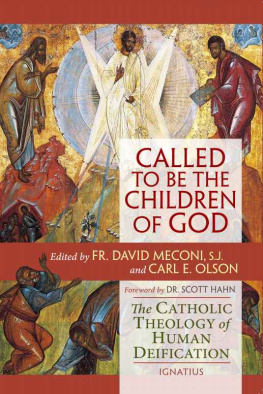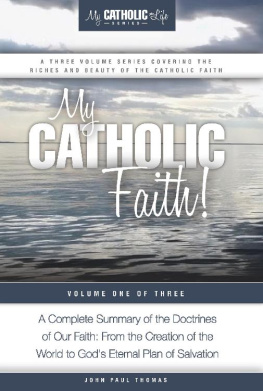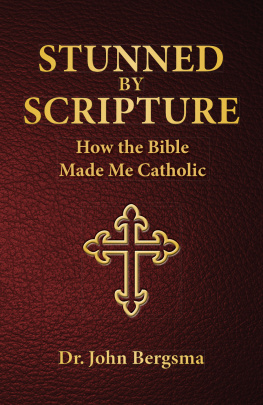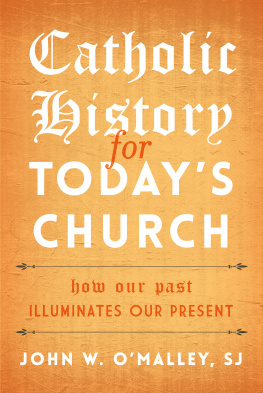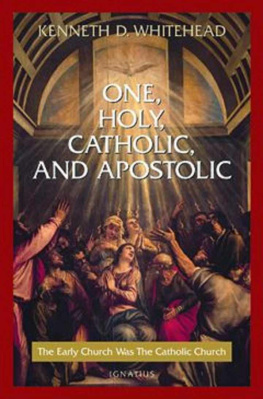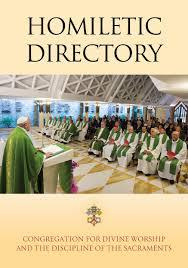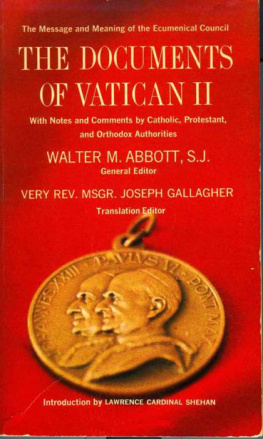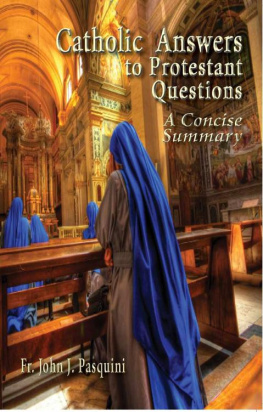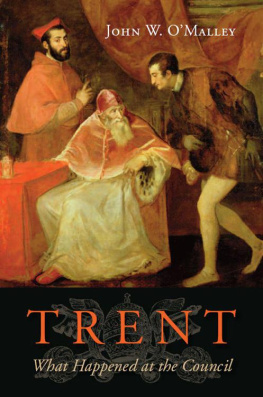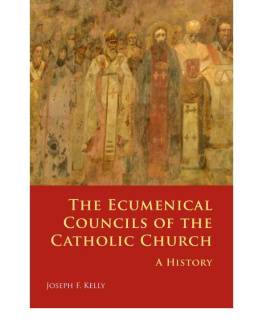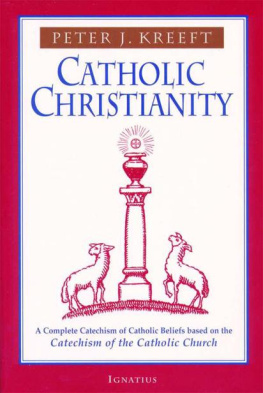CALLED TO BE THE CHILDREN OF GOD
CALLED TO BE
THE CHILDREN
OF GOD
The Catholic Theology
of Human Deification
Edited by
DAVID VINCENT MECONI, S.J.
CARL E. OLSON
IGNATIUS PRESS SAN FRANCISCO
Unless otherwise noted, Scripture quotations (except those within citations) are from the Revised Standard Version of the BibleSecond Catholic Edition, 2006 by the National Council of the Churches of Christ in the United States of America. All rights reserved.Excerpts from the English translation of the Catechism of the Catholic Church , second edition, 1994, 1997, 2000 by Libreria Editrice VaticanaUnited States Conference of Catholic Bishops, Washington, D.C. All rights reserved.All citations from official Church documents, unless otherwise indicated, have been taken from the Vatican website (http://w2.vatican.va/content/vatican/en.html).
Cover art:
The Transfiguration
By Theophanes the Greek
15th century icon
Tretyakov Gallery, Moscow, Russia
Wikimedia Commons
Cover design by Carl E. Olson
2016 by Ignatius Press, San Francisco
All rights reserved
ISBN 978-1-58617-947-2 (PB)
ISBN 978-1-68149-703-7 (EB)
Library of Congress Control Number 2014944006
Printed in the United States of America
CONTENTS
Scott Hahn
David Vincent Meconi, S.J. and Carl E. Olson
David Vincent Meconi, S.J. and Carl E. Olson
Daniel A. Keating
Jared Ortiz
David Vincent Meconi, S.J .
Andrew Hofer, O.P .
Sister M. Regina van den Berg
Chris Burgwald
Michon M. Matthiesen
John Saward
Daniel J. Lattier
Timothy Kelly
Adam G. Cooper
Tracey Rowland
Carl E. Olson
David W. Fagerberg
FOREWORD
Scott Hahn
Christianity is about salvation. Jesus made that clear, and the New Testament is about nothing else. For the Son of man came to seek and to save the lost (Lk 19:10). I did not come to judge the world but to save the world (Jn 12:47). Believers have always looked to Jesus as Savior. All who profess the Christian religionor even simply study it from afarcan agree upon that one simple fact. The most ancient sources agree with the most recent tracts left behind on the subway, the claims of viral emails, and the scrawl of roadside graffiti (Jesus Saves!). The saying is sure and worthy of full acceptance, that Christ Jesus came into the world to save sinners (1 Tim 1:15).
But what do we mean when we speak of salvation? Ask a hundred Christians today, and you will hear many answers, but most come down to this: Jesus saves us from sin and death. Rescue from sin and death is indeed a wonderful thingbut the salvation won for us by Jesus Christ is incomparably greater. And that is the subject of this book.
Salvation is much more than most people believe and hope it could be. For we are not merely saved from sin; we are saved for sonship, to be divinely adopted sons and daughters of God. Forgiveness is the precondition for Gods greater gift, the gift that will last beyond our death: the gift of divine life.
God adopts us as children, so that we can share the life of the eternal Son, Jesus Christ. He can only adopt us, however, when we have come to share his nature. Adoption and fatherhood imply a certain commonality, a degree of sameness. I can be a father to any living human being by means of adoption; but I cannot adopt my pets, no matter how much affection I feel toward them. Adoption requires a sharing of life; and so God gives us by grace what the eternal Son possesses from all eternity. God gives us a created share of his uncreated nature. When we are saved, we participate in Jesus divinity. We become partakers of the divine nature (2 Pet 1:4).
The early Church Fathers were so bold as to call this process divinization and deification, because it is the means by which we enter the life of the Trinity, the eternal family of God. Salvation could not get any better than this. We are Gods children now. This is our primary identity (see 1 Jn 3:1-2), and this is the primary reason why the Word became flesh. God stooped down to become man in order to raise us up as his children. Thus we are made divine. Saint Basil the Great put it boldly, in A.D. 375 in his De Spiritu Sancto , when he enumerated the gifts of the Spirit: abiding in God, being made like Godand, highest of all, being made God (9.23).
This is classic Christianity. In recent centuries, however, this primal language of salvation has fallen into disuse in the Western Church. Its decline began in the late Middle Ages, with the nominalist corruption of philosophy and then theology. It is still present, though faintly, in the works of the Protestant reformer Martin Luther. It is identifiable, but barely, in Luthers later contemporary, John Calvin; but it vanishes entirely in subsequent generations of Protestantism. Even in the Catholic Church, the idea of divinization got lost amid all the post-Reformation disputes over the relationship of faith, works, and justification. For four centuries, Catholic and Protestant theologians alike focused so narrowly on these controversies that they obscured the central fact of Christian salvation.
By the late nineteenth century, the Protestant historian of dogma Adolf von Harnack (18511930) dismissed divinization as a pagan corruption of the Bibles pristine and primitive message, which he reduced to the Fatherhood of God and the brotherhood of man. His assertion itself, however, requires the classic doctrine , which (as the contributors to this book ably demonstrate) is explicit anyway in the biblical texts. Mankind cannot know God as Father unless we come to share the nature of the only begotten Son. We cannot know one another as brothers until we are saveduntil we have become brothers in Christ and heirs with him, sharing his divine nature as he has shared our human nature.
Christ is the only begotten Son of God. So our sonship is not the same as his, but it is a participation in his. We are not God; but Jesus himself described our sonship by saying, [Y]ou are gods (Jn 10:34). His Sonship is uncreated and eternal. Ours is a grace; it is created and adoptive. But it is real. In the supernatural order as in the natural order, adoptive children are real children who enjoy the real paternity of their adoptive fathers.
What we have received by grace, however, is greater still than the gift we received from our parents. Through baptism, we are more truly Gods children than we are children of our earthly parents. Through baptism, we are more truly at home in heaven than in the place where we grew up. Saint Maximus Confessor said that we become completely whatever God is, save at the level of being, and we receive for ourselves the whole of God himself, in all his infinity, in all his eternity.
This seems paradoxical: the finite contains the infinite. But it is almighty God who made it possible, by assuming human flesh in Jesus Christ. In doing so, he humanized his divinity, but he also divinized humanity; and thus he sanctifiedmade holyeverything that fills up a human life. This book in all its parts, like Christianity in all its parts, is about salvation. But that means its about everything that fills our lives, on earth and in heaven.
INTRODUCTION
The apostolic and Catholic faith is the continuation, imitation, and appropriation of Christs own life. As important as ethical growth in virtue is, Christianity can never be a religion of law and moral bookkeeping. Rather, the new way of life in Christ is ultimately the essence of love: for the lover is never content simply gazing upon the beloved but longs to be mutually transformed into the other, thereby becoming no longer two but one. This is the heart of love, to find ones own eternal welfare in another. While it is commonplace for all Christians to stress Gods becoming humanwhat theologians have named the Incarnationthis book wants to show what happens when such love is returned, when we humans become Godwhat is referred to as deification, divinization, or the Greek term theosis.
Next page
